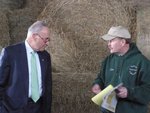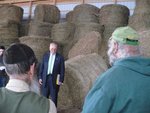BRISCOE — Senator Chuck Schumer didn't look particularly out of place in Dave Weiss's hay barn, a cavernous structure built five years ago when milk prices were booming.
On Tuesday, before a …
This item is available in full to subscribers.
Please log in to continue |


BRISCOE — Senator Chuck Schumer didn't look particularly out of place in Dave Weiss's hay barn, a cavernous structure built five years ago when milk prices were booming.
On Tuesday, before a crowd of about 10 worried farmers and 15 supporters gathered at the farm near Briscoe, Schumer expressed earnestness about the value of family dairy farms.
“It's not just the production of milk,” said Schumer. “It's about great American values: hard work, the relationship of God and man, values that are passed on to the children.”
In March, Schumer was one of 38 senators to sign a letter to U.S. Secretary of Agriculture Sonny Perdue warning that dairy farmers "have continued to face market instability and are struggling to survive the fourth year of sustained low prices."
“I care about dairy farming. It's a passion for me,” Schumer said at the Weiss farm.
The hour-long meeting was organized by the office of state Sen. Jen Metzger, who co-chairs the Senate and Assembly Agriculture Committee. Town of Callicoon Supervisor Tom Bose helped gather the farmers and others.
“Twenty percent of New York farms have left in the last five years,” said Bose, who expressed concern over his own grandchildren's future in farming.
Schumer was aware of the biggest issue: the plummeting milk prices farmers get paid for their milk. “A few years ago, things were good, weren't they?” said Schumer. “It was $23 or $24 per hundredweight. Now you get $16.”
Weiss says milk processors like Dean Foods and Land 'O' Lakes “are making billions” as farmers struggle.
Schumer noted that the new Farm Bill may help. Implementation of the plan is expected to begin in June and would begin affecting farmers for the better in the fall. “If your costs go up, your compensation goes up,” he said.
Another front to address is the issue of tariffs levied by President Trump, a move that has further devastated farmers. “I believe the President is correct in going after China,” Schumer said, “but they went overboard” by penalizing Canada and Mexico as well. New U.S. tariffs have forced those countries into levying harsh taxes on U.S. dairy products.
“We've got to get Mexico and Canada to stop retaliating,” Schumer said.
He did note that a new version of NAFTA coming out this summer prohibits Canada from subsidizing its own class 7 of milk, which consists of milk protein concentrates. That move on the part of Canada has further reduced the market for American milk.
Bose argued for a national minimum milk floor price, that is, the lowest preconceived price that a farmer will accept. Schumer pointed out that states with many “factory” dairy farms are likely to balk at setting a minimum price but nevertheless urged farmers to work with the Sullivan County Farm Bureau to come up with a viable milk floor price and plan.
“Come to me with a good plan to help you,” Schumer said. “I'm open to looking at a new pricing structure. I've got some clout, I want to use it for you.”
Other issues raised by the group included Jeffersonville farmers Stefan and Cindy Gieger commenting on the ongoing issue of national milk overproduction and the need for once again selling whole milk in schools.
“Can you get whole milk back in school?” asked Cindy Gieger.
“I'm all for it,” said Schumer.
Susan Brown-Otto of Kenoza Lake said non-dairy drinks like almond and soy milk should not bear that name. “Absolutely right,” said Schumer.
Bob Franklin, whose Swan Lake organic kosher dairy farm is overwhelmed by a market crying out for more, said, “There is a wide open local market that could save all the farms here. But we need our own dairy processing plant.”
Schumer said there are USDA economic development funds for that.
But unpleasant immediate realities loom large for farmers. Dawn Erlwein of the Myers Century Farm in Jeffersonville said that once again, her farm and others are threatened with the potential loss of their milk market, as happened last spring.
Herman Herbert, whose dairy farm lies in the Beechwoods section of Callicoon, said he worries about money for seed corn to plant and for immediate feed for his herd.
“I've lost $3,000 each month for the past year and a half,” Herbert said. “How long can you go on like that?”
Comments
No comments on this item Please log in to comment by clicking here